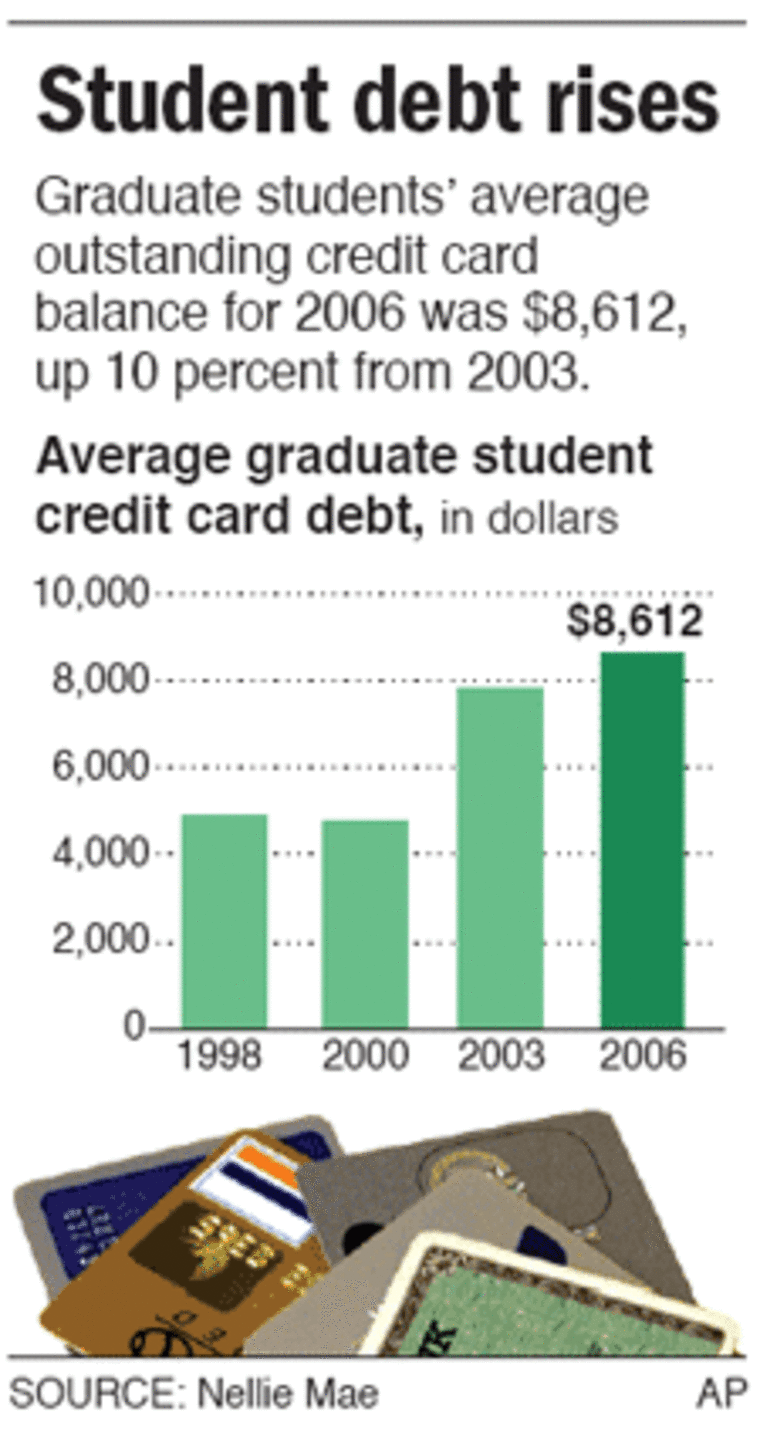Graduate students seem to be pulling out their credit cards more often to pay for school expenses — a trend that worries financial experts.
A study released Wednesday by Nellie Mae, a company based in Braintree, Mass., that provides education financing for college students, found that more than nine in 10 graduate students had at least one credit card in the 2006-07 academic year. Their average outstanding balance was $8,612, up 10 percent from the $7,831 average balance when the study last was done in 2003.
While most say they try to make at least the minimum payment every month, just 20 percent pay off their cards in full, so students’ balances continue to grow.
One reason graduate students carry a lot of debt is that they’ve been building on the $3,500 in card debt they carried when they completed their undergraduate studies, said Marie O’Malley, a spokeswoman for Nellie Mae, which is a division of the SLM Corp., also known as Sallie Mae. And graduate students typically are eligible for fewer grants and scholarships than undergraduates, making them more dependent on their own financing.
More than 94 percent of the students used their credit cards for school-related expenses, especially the purchase of textbooks, school supplies and transportation. Nearly one-third used their cards for tuition costs, and more than one-third used them to cover college fees.
“We know there are more cost-effective ways to pay for college,” O’Malley said, noting that most student loans carry lower rates and better repayment terms than credit cards. She added that it was unclear if graduate students were unaware of alternatives or didn’t take the time to hunt them down.
Business students carried the highest average debt at nearly $14,000 followed by law students, and medical or dental students.

O’Malley theorized that students in professional fields may run up more debt because “they may be looking ahead and saying, ’I can afford to do this because I’m going to be working at a well-paying job soon.”’
Stephen R. Bucci, who is with the Money Management International credit counseling agency and author of the “Credit Repair Kit for Dummies” book, worries that even smart graduate students may not understand the implications of carrying too much debt or of mishandling it.
“While they’re in school, they don’t pay a lot of attention to the monetary costs, the interest costs of credit,” he said. So they add credit card debt on top of their undergraduate and graduate student loans.
Then they go out into the real world and, if they have a bad credit record, it can hurt more than their ability to borrow because potential employers as well as would-be landlords and others check credit scores.
“These kids need to get a job, rent an apartment, get insurance,” he said. “And guess what you can’t do easily with bad credit — all three.”
Adam K. Levin, a former New Jersey state consumer affairs director who is president of Credit.com Inc., said he believes many students are heavy users of credit cards because, like their parents, “they’re trying to rack up rewards points and other benefits” card companies offer.
“The ugly word is ’consequences,’ and that comes back every 30 days in the form of a bill,” said Levin, whose San Francisco-based company provides education and information about credit products.
Levin also worries that students “are facing crushing expenses” as the cost of getting a college education soars and students feel “they have to turn to whatever (loan) instrument they can get their hands on to make it through.”
He suggests that students understand:
- That the wonderful jobs they expect to get after graduation to solve all their money problems may not be there.
- That a bad credit record “can come back to haunt” when the graduate wants to borrow for a home or change jobs.
- That even if students try to be careful, they can be tripped up by the small print in credit card disclosures, including issuers’ ability to raise rates or change terms at any time.
Both Levin and Bucci college students would benefit from better financial education.
“Parents should have that talk with their kids,” Bucci said.
Added Levin: “It’s important to know how trigonometry works, but high schools and college need to focus more on financial management — not about business but about life.”